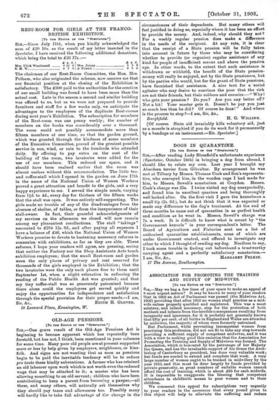OLD-AGE PENSIONS.
[TO THE EDITOR 07 THE "SPECTATOR." J Sis,—One grave result of the Old-Age Pensions Act is beginning to become apparent which has repeatedly been foretold, but has not. I think, been mentioned in your columns for some time. Many poor old people are at present supported more or less by help given by employers, neighbours, or kins- folk. And signs are not wanting that as soon as pensions begin to be paid the inevitable tendency will be to reduce pro tanto these kindly subventions. A farmer who has retained an old labourer upon work which is not worth even the reduced wage that may be attached to it; a master who has been allowing something to an old servant; children who have been contributing to keep a parent from becoming a pauper,—all these, and many others, will naturally ask themselves why they should pay taxes and allowances too. Possibly many will hardly like to take full advantage of the change in the circumstances of their dependents. But many others will feel justified in doing so, especially where it has been an effort to provide the money. And, indeed, why should they not ? For a weekly regular pension does make a difference in the needs of the recipient. At any rate, it is clear that the receipt of a State pension will be fully taken into account in future by those who may be considering whether to provide (or organise) regular assistance of any kind for people of insufficient means and above the pension age. In other words, to the extent that such assistance is withdrawn or withheld, the benefit of the State pension- money will really be enjoyed, not by the State pensioners, but by the parties who would, but for the grant of State pensions, have furnished that assistance. A nice text for a 'social agitator who may desire to convince the poor that the rich are not their friends, but their robbers and enemies :—" Why ! who gets your pension ? Do you ? Are you any better off ? Not a bit! Your master gets it. Doesn't he pay you just so much less than be did ? Of course he does!" And where is the process to stop P—I am, Sir, &c., Burghfield. H. G. WILLINK.
[Of course. State aid invariably kills voluntary aid, just as a muscle is atrophied if you do its work for it permanently by a bandage or an instrument.—En. Spectator.]














































 Previous page
Previous page